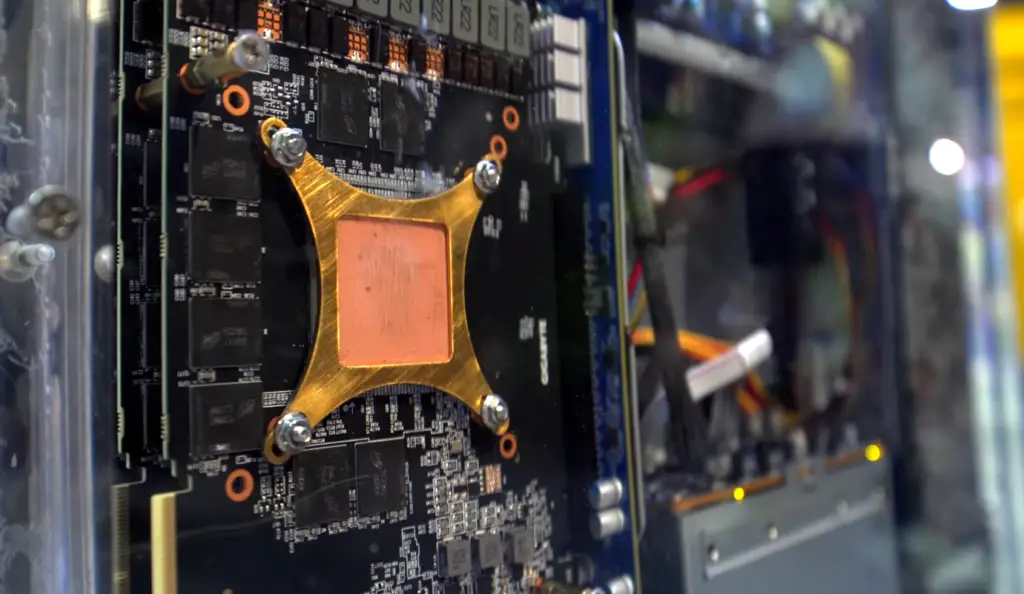Have you ever wondered if mineral oil is conductive? It’s a question that comes up for makers, scientists and hobbyists alike. On the face of it, mineral oil isn’t something we often associate with electricity or electrical current. But with the latest advances in research and technology, this widely-available substance has suddenly become an oddly interesting topic to explore. To answer the burning question – can flammable mineral oil act as a conductor of electricity – keep reading! In this blog post, we’ll take a look at why Mineral Oil’s role in conducting electricity is a growing field of study and some key facts about its conductivity properties.
Is Mineral Oil Conductive?

This makes it a popular choice for dielectric fluids in electrical equipment because it prevents short circuits or other unwanted electrical activity from occurring. Its non-conductivity also makes it useful for preventing corrosion of metals by isolating them from each other. It can also be used as a lubricant on moving parts, such as bearings, and helps to reduce friction between them. Although mineral oil may not be conductive, its properties can still be altered by adding certain chemicals that can increase its ability to carry electrical charges if needed. In conclusion, mineral oil is generally not considered conductive but its characteristics can be changed through the use of additives. This makes it a versatile material that can be used in various applications from electrical to lubrication and corrosion prevention.
Therefore, mineral oil is an incredibly useful substance for many reasons, and its non-conductive properties make it ideal for certain types of applications where electricity must be kept separate or contained. Its versatility also ensures that it can be adapted for any number of uses, making it a great choice for many industries. Ultimately, Mineral Oil’s ability to remain non-conductive ensures that it is an excellent option when dealing with electrical systems or components that must remain isolated from one another.
Why Is Mineral Oil Non-Conductive?
Mineral oil is a non-conductive material that is commonly used for lubrication and insulation in electrical components. It does not conduct electricity because of its molecular structure; the hydrocarbon molecules contain no free electrons, so they cannot easily transfer electrical charges between one another. This means that mineral oil cannot be used to carry electric current or create an electrical circuit.
As a result, it is often used as an insulator in electrical products such as computer power supplies and transformers. Its low volatility also makes it useful for protecting delicate electronic components from heat, dust, dirt, and moisture. Additionally, mineral oil has excellent lubricating properties which can help protect moving parts from wear and tear. For these reasons, mineral oil is a popular choice for a variety of electrical applications. [1]

Is Mineral Oil Safe for Electronics?
The short answer is that mineral oil is not conductive and therefore can be used safely with electronics. However, it’s important to note that while mineral oil itself may not be conductive, if there are contaminants in the mineral oil it could cause problems in some electronic components. Contaminants such as metal particles or other conductive materials can make the mineral oil more dangerous for use with electronics as they can interfere with circuit boards and other sensitive components.
It’s also important to remember that even though pure mineral oil is safe for most electronic applications, it does have some potential drawbacks. For example, since it doesn’t evaporate easily, any spills would need to be cleaned up carefully and completely before turning on any electronics.
Ultimately, while mineral oil is generally safe to use for most electronics applications, it’s best to consult with a qualified technician before using it in any situation. This will ensure that the mineral oil is properly handled and applied in order to reduce risks of damage or contamination. [2]
What Does Mineral Oil Do to Electronics?
Mineral oil is primarily used for cooling and lubrication purposes in electronics. It can be used to fill a specific area surrounding the electronic component, or it can be added directly onto the circuit board. In both cases, the mineral oil helps direct heat away from sensitive components by absorbing and dissipating heat.
Additionally, the lubrication properties of mineral oil help prevent wear and tear on circuit boards caused by friction due to moving parts or dust particles.
Overall, when applied in the correct way, mineral oil provides an efficient way to cool and protect electronics without posing any significant risks. However, even with all of these benefits it’s still important to be careful when handling mineral oil as it could cause damage if not handled properly.
Therefore, if you’re considering using mineral oil for electronics applications it’s important to first consult a qualified technician who can help ensure that the mineral oil is safely and correctly applied. Doing so will reduce the chance of any issues occurring, which could otherwise cause serious damage to your electronics. [3]

Is All Mineral Oil Non-Conductive?
No, not all mineral oil is non-conductive. Mineral oils contain some impurities such as sulfur, carbon dioxide, and metals that can increase their electrical conductivity. Additionally, the type of mineral oil used in a particular application may have an effect on its electrical conductivity; for example, low viscosity mineral oils tend to have higher levels of impurities than higher viscosity mineral oils. It is therefore important to consider the specific type of mineral oil being used when determining whether or not it is suitable for use in applications involving electricity. Moreover, using high purity mineral oil minimizes the risk of electricity arcing across gaps or spots that are especially conductive due to increased levels of impurities.
Ultimately, it is difficult to definitively state whether or not mineral oil is conductive. Factors such as purity, viscosity, and type all make it impossible to make a blanket statement on the matter. Therefore, when using mineral oil in any application that involves electricity, it is important to be aware of its potential conductivity and take appropriate measures to ensure safety. [4]
Is Mineral Oil Flammable?
Many people ask if mineral oil is flammable, and the answer is no. Mineral oil is a petroleum-based product that does not burn easily. It can be exposed to very high temperatures without catching fire. It also has a very low vapor pressure, which means it evaporates slowly and is unlikely to produce a combustible atmosphere.
For these reasons, it poses very little risk of fire or explosion in its liquid form. However, when heated to temperatures above 500°C (932°F) for extended periods of time, it may decompose and release flammable vapors such as carbon dioxide and ethylene oxide. These vapors may then ignite due to contact with an ignition source such as a spark or open flame.
Therefore, while mineral oil itself is not flammable, it can produce combustible vapors when heated to extreme temperatures. It is important to take the necessary precautions when handling and storing mineral oil to minimize the risk of fire or explosion.
Is Mineral Oil An Insulator?
No, mineral oil is not an insulator. Mineral oil is a liquid hydrocarbon composed of saturated and unsaturated hydrocarbons. It has good electrical resistivity properties and can conduct electricity. Thus, it cannot be classified as an insulator but rather a conductor of electricity.
The electrical conductivity of mineral oil depends on its composition; the higher the aromatic content, the higher the conductive properties. However, even with high levels of aromatics, mineral oils are still not highly conductive materials compared to other liquids such as water or alcohols. Moreover, depending on its composition and concentration level, it may also be semi-conductive or non-conductive in certain cases.

Apart from its electric resistance properties, mineral oil also has other benefits such as corrosion resistance and low volatility. It is widely used in various fields due to its non-flammability and non-toxicity. The most common application of mineral oil is for lubrication, insulation, cooling, and hydraulic applications. [5]
FAQ
Can I use mineral oil on electronics?
No, you should not use mineral oil on electronics. Mineral oil is an insulator, meaning that it does not conduct electricity or other forms of energy very well. This means that if you were to use mineral oil on any electronic components, it could end up damaging them and potentially being a fire hazard.
What is the difference between mineral oil and electrical insulation?
Mineral oil is hydrophobic, which means it repels water and prevents moisture from entering into electronic components where it could cause damage. Electrical insulation, on the other hand, is designed to protect against electric shock and safely contain electrical currents within wires and other components. While they both have similar properties of preventing moisture and conducting electricity, mineral oil is not suitable for electrical insulation, as it does not provide the same level of protection from electric shock as insulation materials do.
Is mineral oil conductive?
No, mineral oil is not conductive. As mentioned above, it is an insulator that prevents electricity from flowing through it. This means that if you were to apply mineral oil on any wires or electronic components, they would be unable to properly conduct electric currents and could result in damage or even a fire hazard. For this reason, it’s important to use the appropriate type of insulation when working with electronics.
What is the conductivity of mineral oil?
The conductivity of mineral oil is very low. It is an insulator, meaning it does not easily allow electricity to flow through it. This makes it a great choice for use in electrical components as it prevents short circuits or other damage from occurring due to current leakage. However, this also means that any device connected to a circuit containing mineral oil must be carefully insulated from the oil itself in order for the device to work properly. Mineral oils are non-polar molecules and have virtually no affinity for electrons making them ideal insulators. In addition, they are chemically stable and highly resistant to oxidation and corrosion which helps maintain their integrity over long periods of time.
Which oil is conductive?
No oils are truly conductive, but certain synthetic fluids can be more conductive than others. These fluids include silicone oil, fluorinated liquids, and ether-based oils. Generally speaking, these fluids have a higher affinity for electrons, making them better conductors than mineral oil. However, they tend to be much more volatile and require careful handling in order to prevent damage or contamination of electronic components. Additionally, these fluids may dissolve certain materials used in electrical circuits and components which can lead to performance issues or complete failure of the device over time.
Is mineral oil okay for PCs?
Because mineral oil is a non-conductive, chemically stable liquid, it can be used in certain computer components as a cooling or lubrication medium. In general, it should not be used in any component that requires electrical insulation, such as power supplies, processors, and memory. However, mineral oil can be safely used with other components such as hard drives and fans to reduce noise levels. Additionally, the low viscosity of mineral oils makes them ideal for use in active cooling systems like water cooling setups. When correctly applied and maintained, these coolants can drastically reduce temperatures inside a computer case while still providing adequate protection from dust and other contaminants.
Can you use mineral oil as a carrier oil?
Mineral oil, also known as petroleum jelly or liquid paraffin, is a non-conductive, clear, odorless and tasteless oil. It has many uses in medicine, industry and consumer goods. As such, mineral oil can be used as a carrier oil for beauty products and medicinal applications. It provides a layer of protection between the skin and other ingredients in the formulation. Additionally, it helps to ensure that other ingredients remain properly mixed together in order to provide optimal results. Mineral oil is used in many cosmetics including lip balms, lotions and creams. In addition to being an effective carrier oil for beauty products, mineral oil can also be used as a lubricant for medical instruments such as syringes due to its non-conductive properties. This makes it an excellent choice for medical applications as it helps to ensure that delicate instruments are not damaged by electric currents.
Useful Video: What is it? Immersion Cooling in 60 seconds
Conclusion
In conclusion, mineral oil is generally not conductive and cannot be used for electrical purposes. However, it can be difficult to determine the exact degree of conductivity in certain cases due to a variety of factors such as temperature, pressure, impurities, etc. Therefore, if mineral oil needs to be used in an application where electrical conductivity is desired or necessary, it is important to consider all possible variables and test the product thoroughly before using it. Additionally, there are specialized oils available that contain additives specifically designed to increase their conductivity. These may offer a better solution depending on the application’s requirements. Ultimately, mineral oil remains a versatile and useful lubricant/coolant but its poor electrical conducting properties must be taken into account when considering its use.
References
- https://www.circuitsgallery.com/is-mineral-oil-conductive/
- https://healingpicks.com/does-mineral-oil-conduct-electricity-sounds-strange-read-on/
- https://www.kingston.com/en/blog/gaming/mineral-oil-cooling-pc-builds
- https://www.pugetsystems.com/mineral-oil-pc/
- https://www.ncbi.nlm.nih.gov/pmc/articles/PMC6423702/











Leave a Reply